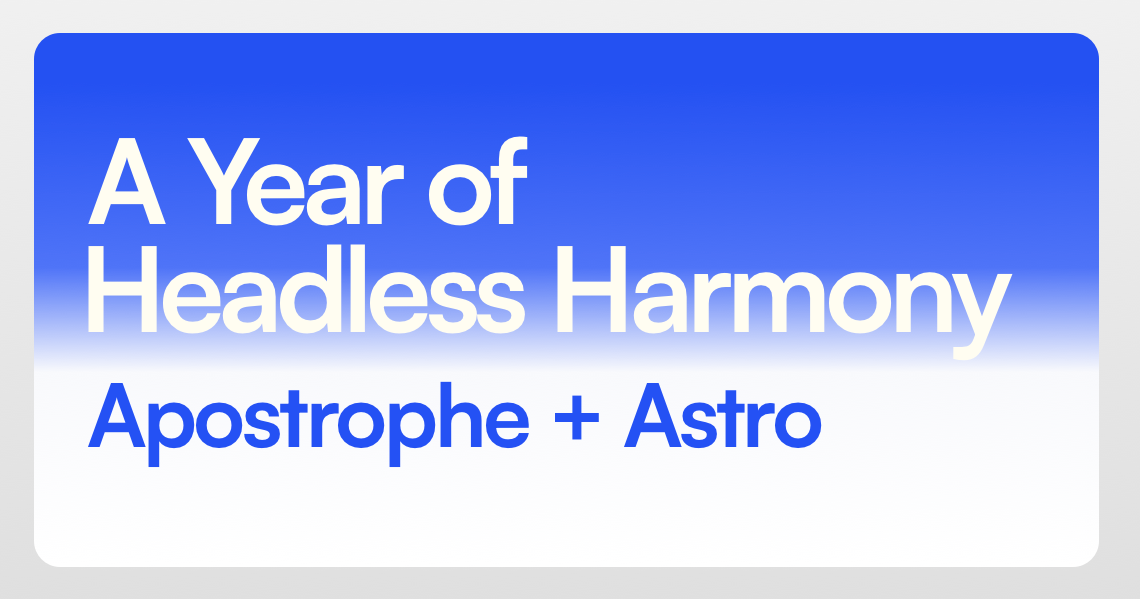One year after launching the Apostrophe + Astro integration, we’re taking a moment to reflect on what we’ve built, how adoption is growing, and what’s next for developers and content teams alike.
Looking Back: Why We Invested in Astro
Astro caught our team’s attention in 2023 for its unique approach to modern frontend development—offering an exceptional developer experience and performance focus with a strong emphasis on content-driven websites. Its framework-agnostic flexibility aligned perfectly with our vision of equipping digital teams with the best tools to build content-heavy experiences.
Our investment in Astro really took off when our partners at Michelin decided to center their new frontend tech stack around it. Thanks to Michelin’s talented platform team and our close collaboration, they pioneered a technique to seamlessly integrate ApostropheCMS with Astro. Their goal was to modernize their frontend while preserving an intuitive in-context editing experience for their content editors. The result was a best-of-both-worlds solution: a clean separation of concerns between an Astro-powered frontend and an ApostropheCMS backend, all while maintaining the seamless editing experience Apostrophe users expect.
What We’ve Built Together
Since Michelin’s original prototype, we’ve evolved their work into a fully supported and maintained integration for Astro, along with additional resources to make adoption easier:
- Official documentation to guide developers through setup and best practices.
- A streamlined monorepo solution with our combined-astro-starter.
All of this has been aimed at making it as easy as possible to get started with ApostropheCMS if you’re coming from the Astro ecosystem. With this week’s release of the Apollo theme, there’s never been a better time to try Apostrophe + Astro in your own projects.
At the same time, we’ve continuously improved the integration’s stability, ensuring it remains compatible with Apostrophe’s latest features. This includes support for more advanced capabilities like Breakpoint Preview, so teams using Astro can take full advantage of Apostrophe’s editorial experience.
What’s Next for Apostrophe + Astro
Michelin’s use of Astro and ApostropheCMS has proven successful, expanding its footprint within their global digital experience platform. At the same time, some of our agency partners are beginning to adopt Astro as their preferred approach to building with ApostropheCMS. While it’s still early days, we see this as the foundation for a growing adoption of Astro within the Apostrophe community.
Beyond our own ecosystem, we’ve been inspired by the rapid growth of Astro and its surrounding open-source community. We’re committed to strengthening our integration by continuously improving the developer and editor experience while expanding the resources available to help teams get started.
Looking ahead, we plan to release more developer-focused content, including more tutorials and guides that showcase Apostrophe + Astro in action. In the coming weeks, you can expect new materials that leverage the Apollo theme as a starting point, making it easier than ever to explore the possibilities of this integration.
An Open Invitation
A year in, we’re proud of what we’ve built with the Apostrophe + Astro integration, and we’re excited about what’s ahead. Whether you’re a longtime Apostrophe user curious about Astro or an Astro developer looking for a powerful CMS, now is the perfect time to explore what this combination can offer.
If you haven’t already, check out the Apollo theme as a hands-on way to experience Apostrophe + Astro. We’d love to hear from developers experimenting with the integration—what’s working well, what could be improved, and what resources would help you succeed.
Astro is evolving rapidly, and we’re committed to growing alongside it, ensuring that Apostrophe remains a first-class choice for content-rich, high-performance web experiences. If you're building with Apostrophe + Astro, share your experience with us—we’re excited to see what you create.
Ready to get started?
- Explore the Apollo theme
- Read the official documentation
- Join the discussion in Discord

